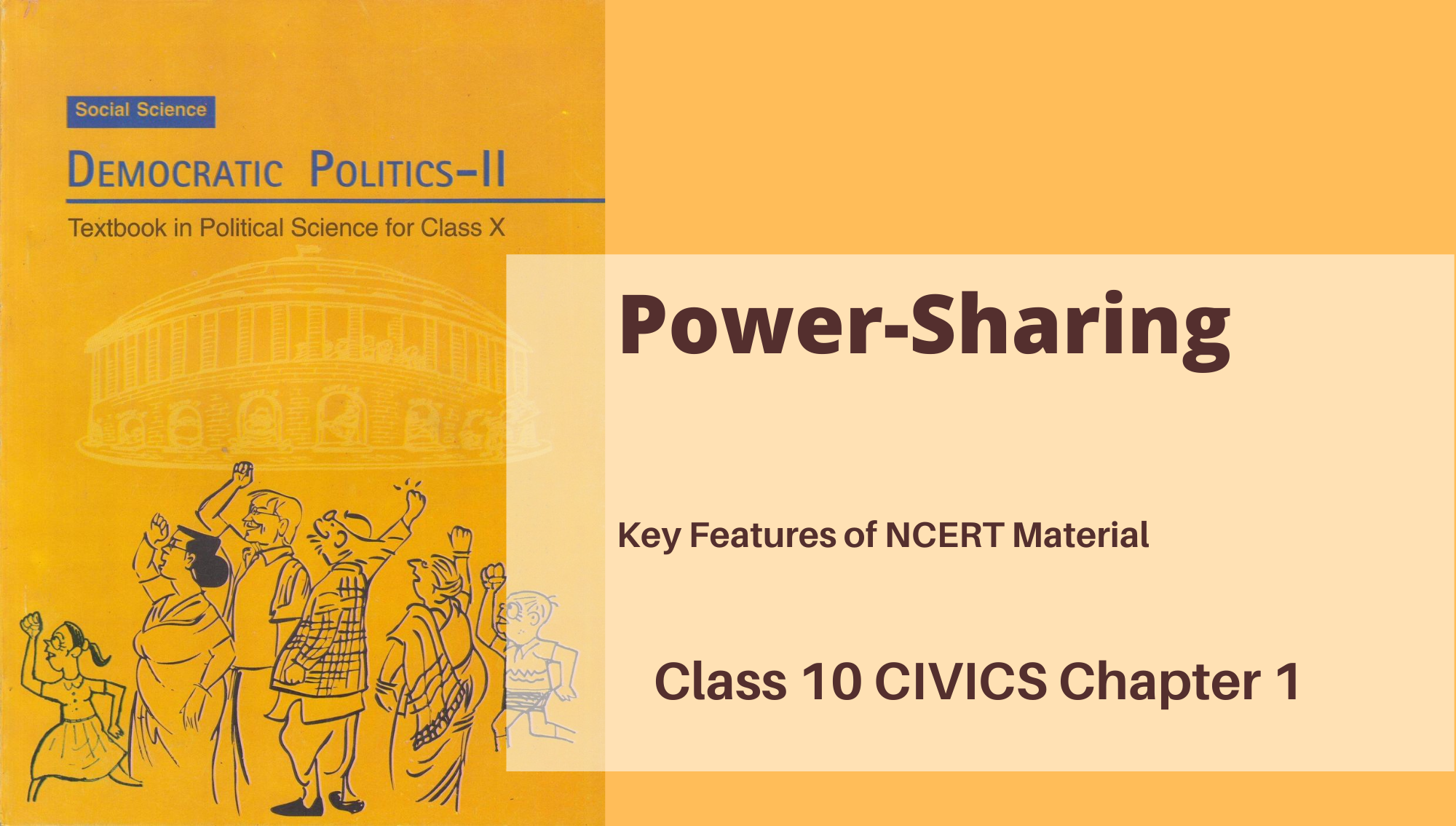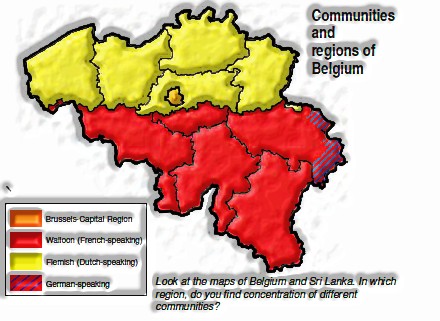Power-Sharing: Class 10 Civics NCERT Chapter 1

Key Features of NCERT Material for Class 10 Civics Chapter 1 – Power Sharing
Introducing you the Civics or say Political Science Chapter 1: Power Sharing, where you will learn about the power consumption and how power connection spreads to whole world. (Power-Sharing: Class 10)
Story of Belgium
Belgium is a little country in Europe with a population of more than one crore, about a huge bit of the number of occupants in Haryana. Of the country’s finished masses, 59% impart in the Dutch language, 40% of people see in French, and the remainder of the 1% convey in German. Look at the guide underneath to know the language assortment of Belgium. The minority French-talking network was rich and powerful, so they got the fiscal new development and preparation. This made weights between the Dutch-talking and French-talking networks during the 1950s and 1960s.

Comfort in Belgium
In Belgium, the council managed the network to differentiate very well. Someplace in between 1970 and 1993, Belgian pioneers changed their constitution on numerous occasions and thought of another model to run the organization.
Here is a part of the segments of the Belgian model.
The Constitution supports that the amount of Dutch and French-talking ministers will be comparable in the Central Government. Some various laws require the assistance of the majority of the people from each etymological social event. Along these lines, no single network can choose decisions independently.
The state governments are not subordinate to the Central Government.
Brussels has an alternate government where the two networks have comparable depictions.
Besides the Central and the State Government, there is a third kind of government. This ‘social order government’ is picked by people having a spot with one language network – Dutch, French, and German-talking – paying little heed to where they live. This governing body has the power concerning social, enlightening, and language-related issues.
The Belgium model was confounded, yet it kept up vital good ways from the metro struggle between the two noteworthy networks.
Lively adjustment notes
Belgium and Sri Lanka:
Belgium is a little country in Europe.
It has borders with the Netherlands, France, and Germany.
59% in the Flemish territory conveyed in Dutch.
Another 40% of people live in the Wallonia territory and converse in French.
Remaining 1% of the Belgians impart in Germany.
In Brussels, 80% of people impart in French, while 20% are Dutch – talking.
The minority French – talking network was modestly rich and powerful.
This was hated by the Dutch-talking network who got the upside of the financial new development and guidance significantly later.
The weight between the two networks was intense in Brussels.
Like various nations in the south Asia region, Sri Lanka has different masses.
The Sinhala talks are 74%, and Tamil speakers are 18%
Among Tamils, there are two subgroups. The Tamil local people of the country are assigned “Sri Lankan Tamils”; the rest whose precursors began from India as mass workers during the boondocks time period is called ‘Indian Tamils.’
Majoritarianism in Sri Lanka:
Sri Lankan was created as a self-sufficient country in 1948.
The pioneers of the Sinhala social order hoped to ensure the organization’s transcendence by the morals of their more significant part.
In 1956, an Act was passed to see Sinhala as the fundamental language, thus overlooking Tamil.
Another constitution indicated that the state would make sure about and develop Buddhism.
All these coming measures, arriving in a consistent movement, a tiny bit at a time extended the assumption of separation among the Sri Lankan Tamils.
Along these lines, the relations between the Sinhala and Tamil society worried after some time.
The Sri Lankan Tamils impelled social affairs and fights.
In any case, their enthusiasm for more self-administration to domains populated by the Tamils was again and again denied.
The uncertainty between the two networks changed into an expansive battle. It, after a short time, changed into CIVIL WAR.
The regular war made a terrible hardship the social, social, and fiscal presence of the country.
Accommodation in Belgium:
Belgium saw the nearness of provincial complexities and assorted social varieties.
Therefore, somewhere close to 1970 and 1993, they changed their constitution on numerous occasions to work out a strategy that would empower everyone to live individually inside a comparable country.
Here is a part of the segments of the Belgian model:
a) The Constitution suggests that the amount of Dutch and French-talking clerics will be identical in the central government.
b) Numerous powers of the central government have been given to states’ organization of the two of the country’s regions.
c) Brussels has a confined government where both the networks have proportionate depiction.
d) Aside from the central and state government, there is a third kind of government. This is a network government.
In Belgium, the pioneers have comprehended that the solidarity of the country is possible just by with respect to the feelings and interests of different networks and regions.
Sri Lanka shows us a separating model. It gives us that if an all the more enormous piece of the network needs to drive its quality over others and won’t share power, it can undermine the country’s solidarity.
Why is power-sharing appealing?
Along these lines, two one of a kind courses of action of reasons can be given for power-sharing.
Power-sharing is satisfactory on the grounds that it helps with decreasing the opportunity of conflict between social gatherings.
There is a second, further inspiration driving why power sharing is helpful for vote based system. Power-sharing is the very soul of popular government. An equitable standard incorporates offering power to those affected by its action and needs to live with its effects.
Let us call the central plan of reasons PRUDENTIAL and the resulting great.
While prudential reasons pressure that power-sharing will bring out better results, moral rights underline the very show of power-sharing as fundamental.
Power can be split amongst the governments at distinct levels – a general government for the entire country and governments at the normal or territorial level. The division of higher and lower levels of government is known as the vertical division of power.
Power may, in like manner, be shared among different social gatherings, for instance, the severe and phonetic gatherings. ‘Network government’ is a veritable instance of this strategy.
Therefore, Power-sharing blueprints can, in like manner, be found in how political, social events, pressure gatherings, and developments control or affect individuals with gigantic impact.

